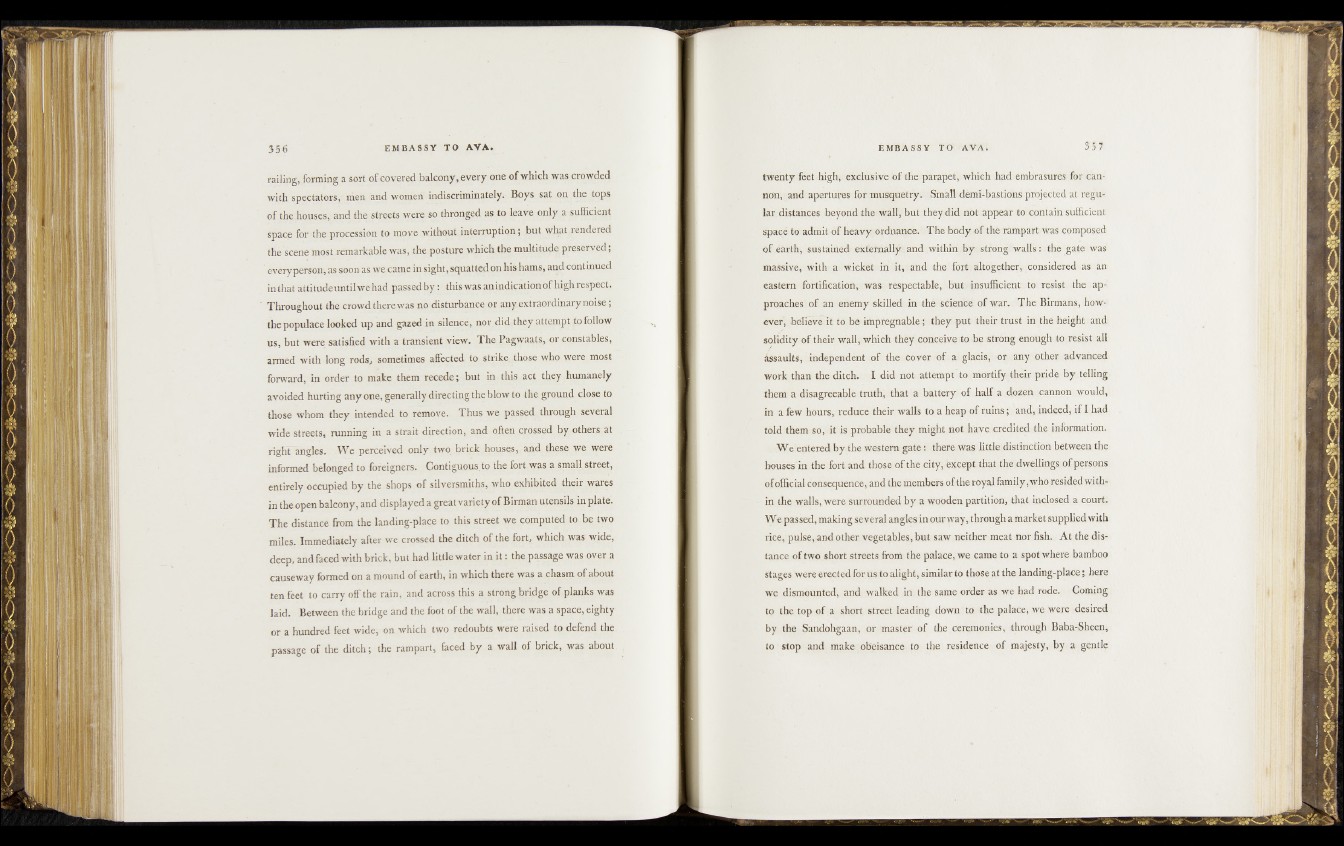
railing, forming a sort of covered balcony, every one of which was crowded
with spectators, men &nd women' indiscriminately. Boys sat. Qn .the ;tppg
of the houses, and the streets were sp thronged as to leave .oply.a sufficient
space for sthe procession to move without Jnterruption; but what gendered
the scene most remarkable was, the posture which the multitude, preserved;
every person, as soon as we came in sight, squatted on his hams, ai^d continued
in that attitudeuntilwehad passed b y : this was anindicationof high respect.
Throughout the crowd there was no disturbance or any extraordinary noise;
the populace looked up and gazed in silence, nor did.they attempt Jo follow
us, but were satisfied with a transient view. The Pagwaats, or constables,
armed with long rods, sometimes affected to strike.;those who were most
forward, in order to make them recede; but in.this act they^upjanely
avoided hurting any one, generally directing the blow to the ground close tp
those whom they intended to remove. Thus we passed, through several
wide streets, r u n n i n g in a strait direction, and often „crosseds by-othec$ at
righFangles. We perceived only two brick houses,/and,, these we were
informed belonged to foreigners. Contiguous.to the fort was a small street,
entirely occupied by the shops of silversmiths, who exhibited their wares
in theopen balcony, and displayed a great variety of Birman utensils in plate.
The distance from the landing-place to this street we computed to .be two
miles. Immediately after we crossed the ditch of the fort, which,was wide,
deep, and faced with brick, but had little water ip ,it: the passage was overp
causeway formed on a mound of earth, in which there was a chasm of about
t e i feet to carry off the rain, and across this a strong bridge pfplanks was
laid. Between the bridge and the foot of the wall, there was a space, eighty
or a hundred feet wideron which two redoubts were raised to defend the.
passage of the ditch ; the rampart, faced by a wall of brick, was about
twenty feet high, exclusive of tlie parapet,. which had embrasures-for earn
non, and:apeatures for musquetry. SmaH.demi^bastiohsfdrbjected at ’rggu?
lar distances beyond the wall, buCitheydid nottsappear ,tofiepntain sufficient
space to admit of heavy ordnance. YThe body;©/ Che-rampartwas composed
of earthy sustained^ externally» and .withi%by®stfonghva]ls Kt'th&gajei-was
massive,-with a- wicketui’ffilit;jaiid the fort f|lit0^e,fhed4consid’ered;ias‘ an
eastern fortification,, was respectable,'.butaqnsufficient to -resist.'.theuapA
proaches of. an enemy skilled in the, science of war.f'The Birmans,
ever, bfefievedt to be impregnable; .they put -their trust inches height I and;
solidity of their wall, which th ^ ' eonGeiyelto.#teStrong eno'u.ghitq.>resistsal
Assaults, independent of thescover ref. aiglaeisy- or anytbMie^tadvaraeed
work than the ditch. I did, nott,attempt'tor-1marrify»Jthei*p^idlt'%j telling,
them a disagreeable truth, that a battery of half a dozen tvinnpn ■would,-1
m a few hours, reduce their walls to a heap of rums;, and, naked,
told them .so, it is probable they might not haver,credited th^jnfoj^atiqp..
Welentered by the western gate: there was little.distincfioii bqtweu-i the,
bouses m the foit ami those of the city, ’except that the d\\ tiling sjof peisons;
of official cotisequenee, and the members ofthe royal family, wbogesided within
the walls, were surrounded by a wooden partition, that;inclosed.a courts
We passed, making several angles in our waythrough affiarket supplied with
rice, pulse, and other vegetables, butsawineither mcat.bor fish. At the distance
of two short streets from the palace, we came to a spot where bamboo
stages were erected for us to alight, similar to those: at the landingTplace; hqre
we dismounted, and. walked id;.the same order as wc had lode. ■ Coming,
to the top of ;a short street leading down ltd the palace-, we w ^ejdesirdd
by the Sandohgaan, Or-master' of the ceremonies, through Baha^Sheen,
to stop and make obeisance to the residence of majesty, by, a-gentle